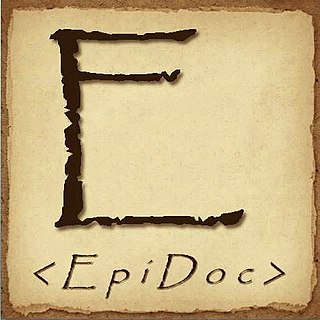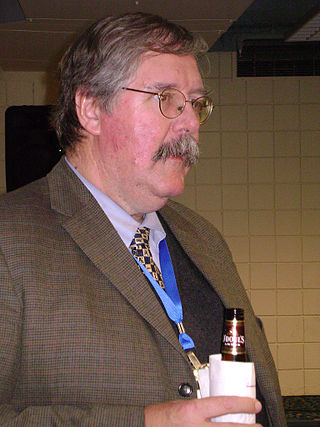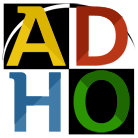Related Research Articles

A markuplanguage is a text-encoding system consisting of a set of symbols inserted in a text document to control its structure, formatting, or the relationship between its parts. Markup is often used to control the display of the document or to enrich its content to facilitate automated processing.
The Perseus Digital Library, formerly known as the Perseus Project, is a free-access digital library founded by Gregory Crane in 1987 and hosted by the Department of Classical Studies of Tufts University. One of the pioneers of digital libraries, its self-proclaimed mission is to make the full record of humanity available to everyone. While originally focused on the ancient Greco-Roman world, it has since diversified and offers materials in Arabic, Germanic, English Renaissance literature, 19th century American documents and Italian poetry in Latin, and has sprouted several child projects and international cooperation. The current version, Perseus 4.0, is also known as the Perseus Hopper, and is mirrored by the University of Chicago.

The Text Encoding Initiative (TEI) is a text-centric community of practice in the academic field of digital humanities, operating continuously since the 1980s. The community currently runs a mailing list, meetings and conference series, and maintains the TEI technical standard, a journal, a wiki, a GitHub repository and a toolchain.
Xaira is an XML Aware Indexing and Retrieval Architecture developed at Oxford University, it was funded by the Mellon Foundation between 2005 and 2006. It is based on SARA, an SGML-aware text-searching system originally developed for searching the British National Corpus. Xaira has been redeveloped as a generic XML system for constructing query-systems for any kind of XML data, in particular for use with TEI. The current Windows implementation is intended for non-specialist users. A more sophisticated and open-source version is currently under development. This version supports cross-platform working using standards such as XML-RPC and SOAP.
Apache AxKit was an XML Apache publishing framework run by the Apache foundation written in Perl. It provided conversion from XML to any format, such as HTML, WAP or text using either W3C standard techniques, or flexible custom code.
Oxford Text Archive (OTA) is an archive of electronic texts and other literary and language resources which have been created, collected and distributed for the purpose of research into literary and linguistic topics at the University of Oxford, England.

EpiDoc is an international community that produces guidelines and tools for encoding in TEI XML scholarly and educational editions of ancient documents, especially inscriptions and papyri.
The British National Corpus (BNC) is a 100-million-word text corpus of samples of written and spoken English from a wide range of sources. The corpus covers British English of the late 20th century from a wide variety of genres, with the intention that it be a representative sample of spoken and written British English of that time. It is used in corpus linguistics for analysis of corpora.

C. Michael Sperberg-McQueen is an American markup language specialist. He was co-editor of the Extensible Markup Language (XML) 1.0 spec (1998), and chair of the XML Schema working group.
Steven J DeRose is a computer scientist noted for his contributions to Computational Linguistics and to key standards related to document processing, mostly around ISO's Standard Generalized Markup Language (SGML) and W3C's Extensible Markup Language (XML).

The Alliance of Digital Humanities Organizations (ADHO) is a digital humanities umbrella organization formed in 2005 to coordinate the activities of several regional DH organizations, referred to as constituent organizations.
Eighteenth Century Collections Online (ECCO) is a digital collection of books published in Great Britain during the 18th century.

The European Association for Digital Humanities (EADH), formerly known as the Association for Literary and Linguistic Computing (ALLC), is a digital humanities organisation founded in London in 1973. Its purpose is to promote the advancement of education in the digital humanities through the development and use of computational methods in research and teaching in the Humanities and related disciplines, especially literary and linguistic computing. In 2005, the Association joined the Alliance of Digital Humanities Organizations (ADHO).
The Association for Computers and the Humanities (ACH) is the primary international professional society for digital humanities. ACH was founded in 1978. According to the official website, the organization "support[s] and disseminate[s] research and cultivate[s] a vibrant professional community through conferences, publications, and outreach activities." ACH is based in the United States, and has an international membership. ACH is a founding member of the Alliance of Digital Humanities Organizations (ADHO), a co-originator of the Text Encoding Initiative, and a co-sponsor of an annual conference.
COCOA was an early text file utility and associated file format for digital humanities, then known as humanities computing. It was approximately 4000 punched cards of FORTRAN and created in the late 1960s and early 1970s at University College London and the Atlas Computer Laboratory in Harwell, Oxfordshire. Functionality included word-counting and concordance building.
In markup languages and the digital humanities, overlap occurs when a document has two or more structures that interact in a non-hierarchical manner. A document with overlapping markup cannot be represented as a tree. This is also known as concurrent markup. Overlap happens, for instance, in poetry, where there may be a metrical structure of feet and lines; a linguistic structure of sentences and quotations; and a physical structure of volumes and pages and editorial annotations.
Susan Hockey is an Emeritus Professor of Library and Information Studies at University College London. She has written about the history of digital humanities, the development of text analysis applications, electronic textual mark-up, teaching computing in the humanities, and the role of libraries in managing digital resources. In 2014, University College London created a Digital Humanities lecture series in her honour.

Sebastian Patrick Quintus Rahtz (SPQR) was a British digital humanities information professional.
CLOC was a first generation general purpose text analyzer program. It was produced at the University of Birmingham and could produce concordances as well as word lists and collocational analysis of text. First-generation concordancers were typically held on a mainframe computer and used at a single site; individual research teams would build their own concordancer and use it on the data they had access to locally, any further analysis was done by separate programs.

Lorna M. Hughes has been Professor in Digital Humanities at the University of Glasgow since 2015. From 2016 to 2019, she oversaw the redevelopment of the Information Studies subject area The re-launch was marked by an international symposium at the University of Glasgow in 2017.
References
- ↑ "SCOTS - Board Members". www.scottishcorpus.ac.uk. Archived from the original on 22 February 2019. Retrieved 22 February 2019.
- ↑ "dblp: Lou Burnard". dblp.uni-trier.de. Archived from the original on 22 February 2019. Retrieved 22 February 2019.
- ↑ "Lou Burnard: his home page". users.ox.ac.uk. Archived from the original on 15 January 2019. Retrieved 22 February 2019.
- ↑ "Lou Burnard - Google Scholar Citations". scholar.google.com.
- ↑ "Mostly true autobiography". users.ox.ac.uk. Archived from the original on 15 April 2017. Retrieved 22 February 2019.
- 1 2 "Lou Burnard His Home Page". users.ox.ac.uk. Archived from the original on 11 September 2017. Retrieved 22 February 2019.
- ↑ "CAFS: A New Solution to an Old Problem | Digital Scholarship in the Humanities | Oxford Academic". Academic.oup.com. 1 January 1987. Archived from the original on 22 February 2019. Retrieved 28 April 2019.
- ↑ "Microsoft Word - SQA Advisory Forum pack.doc" (PDF). Archived (PDF) from the original on 9 March 2017. Retrieved 28 April 2019.
- ↑ Burnard, Lou (September 1997). "The BNC Handbook Exploring the British National Corpus with SARA" (PDF). corpus.leeds.ac.uk. Archived (PDF) from the original on 13 July 2018. Retrieved 28 April 2019.
- ↑ "Digital Resources for the Humanities 2004 :: Speakers". 30 October 2004. Archived from the original on 30 October 2004.
- ↑ "Bibliography". users.ox.ac.uk. Archived from the original on 27 April 2012. Retrieved 28 April 2019.
- ↑ "What is SGML (Burnard)". xml.coverpages.org. Archived from the original on 28 July 2018. Retrieved 22 February 2019.
- ↑ http://citeseerx.ist.psu.edu/messages/downloadsexceeded.html. Archived from the original on 24 April 2019. Retrieved 28 April 2019.
{{cite web}}: Missing or empty|title=(help) - ↑ Burnard, Lou; Bauman, Syd, eds. (2007), TEI P5: Guidelines for Electronic Text Encoding and Interchange (PDF), Charlottesville, Virginia, USA: TEI Consortium, archived (PDF) from the original on 15 January 2019, retrieved 26 February 2019